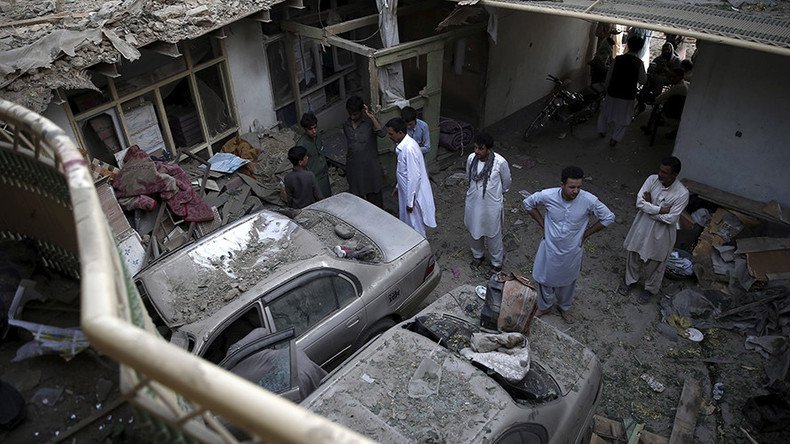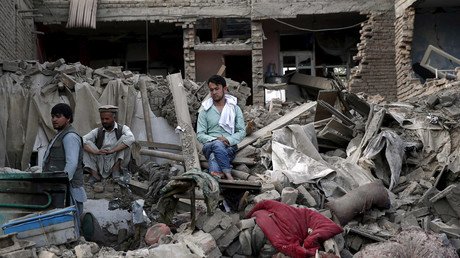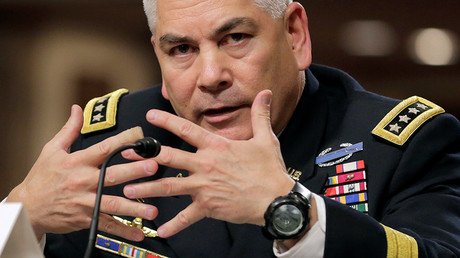‘From Vietnam to Afghanistan, US military intervention has failed to deliver’

The Taliban has continued to grow as it increases the tempo of its military operations, which have become far more effective in gaining control of territory all across the country, says Gareth Porter, investigative historian and journalist.
Civilian casualties in Afghanistan hit a record high of 11,000 people in 2015, according to the latest UN report. The organization stressed the conflict is causing extreme harm to the local population with unprecedented numbers of children killed and injured.
Violence has steadily increased since the withdrawal of US and NATO forces over the past few years, despite – or because of - US President Obama keeping nearly 10,000 US troops in the country.
RT: The number of civilian casualties is only getting bigger. How, when the US says it's bringing peace and stability to Afghanistan?
Gareth Porter: There are different parts to the explanation for the rise in civilian causalities since the formal end of US-NATO combat in Afghanistan took place. Part of it is the fact the US really has not fully withdrawn, and there are still civilian causalities caused by US forces in Afghanistan. The most prominent case of that was the bombing of the MSF [Medecins Sans Frontieres] hospital in Kunsuz, which from all accounts was not really an accident, but something that occurred as a result of information being passed onto the US that the hospital was being used by the Taliban for their operations. That is one example.
But I think far more significant in terms of overall numbers would be the continued operations of the US special operations forces in Afghanistan, which have been for many years carrying out night raids on the homes of suspected Taliban; no judicial process, no anything, except US suspecting somebody of being a Taliban. Those operations have clearly not ended. The bilateral agreement between the US and Afghanistan, which was supposed to have ended those kinds of operations in fact had very ambiguous language, which allowed the US to continue. That, according to reporting that I did a few years ago, in 2012, was probably the largest source of civilian causalities of any of the categories, any of the causes of civilian causalities in the Afghanistan war. That is still causing a considerable number of causalities, which are not being found or included by the UN in their compilation of civilian causalities…
The fighting now is involving the Taliban up against the Afghan government forces, and I think they are targeting far more the Afghan civilian police and other targets there that in many cases would involve civilians in the causality list… The interesting thing is that the Taliban are now accounting for some 62 percent of the total civilian causalities in the UN reporting as opposed to 82 percent just a few years ago in 2012. So there has been a shift in the proportion of the causalities attributed to the Taliban – a much higher proportion now are attributed to the Afghan government and to foreign troops in the country.
RT: The UN is demanding an investigation into the MSF attack and a review of operations in civilian areas. How likely is that to actually happen?
GP: Unfortunately, I doubt it very much. The history of the US military is that unless they are confronted with a political opposition coming from very powerful sources, they do not investigate themselves; they cover up those instances of abuses that are very frequent in places like Afghanistan. I simply don’t think that it is very likely that there will ever be an official investigation of this incident that forces the military to tell the truth.
RT: Do you consider US intervention in Afghanistan a failure?
GP: Absolutely, there is no question about it. The official objective of the US military intervention, or the escalation of the US military intervention in Afghanistan, was to bring the Taliban under control in the sense that they would not be able to continue to increase their operations that in fact they would have to decrease their military operations, and that the size of the Taliban organization would be substantially reduced. It is very clear that the opposite has happened: the Taliban continued to grow, it continued to increase the tempo of its military operations, and those operations have become far more effective in gaining control of territory all across the country – not just in the traditional Taliban zone of influence, but rather in the north and the west of Afghanistan, as well.
It is a massive failure of the US military and of the US government to really have any effect on the Taliban, at least not have an effect that they wanted to have. I think the US intervention perhaps had the opposite effect as it did in Iraq of causing greater resistance to the government of Afghanistan – greater support for the Taliban across the country. Once the US began its withdrawal, then the Taliban had the whiff of ultimate victory about it, and it gave even further impetus to the progress the Taliban has been making around the country.
RT: Obama promised to keep troops there. Will it change the situation?
GP: You have to begin with the fundamental reality that in very few historical instances has a foreign government been able to intervene militarily - particularly with regard to civil wars that involve a very large ethnic or ethno-sectarian group that has a great deal of coherence and is loyal to a particular point of view. This has been the case throughout the recent history of the US where it has intervened beginning with Vietnam and all the way through to Iraq and Afghanistan. The US has been intervening in places where the military force could not possibly prevail. Even if the US had been extremely smart, shrewd, and not made terrible mistakes, it is unlikely that it could have prevailed. I think that the fundamental point I would make is that the idea of military intervention by a superpower, as an exertion of power, is really an illusion. It simply is not realistic given the current socio-political realities, particularly in the Islamic world.
The statements, views and opinions expressed in this column are solely those of the author and do not necessarily represent those of RT.














